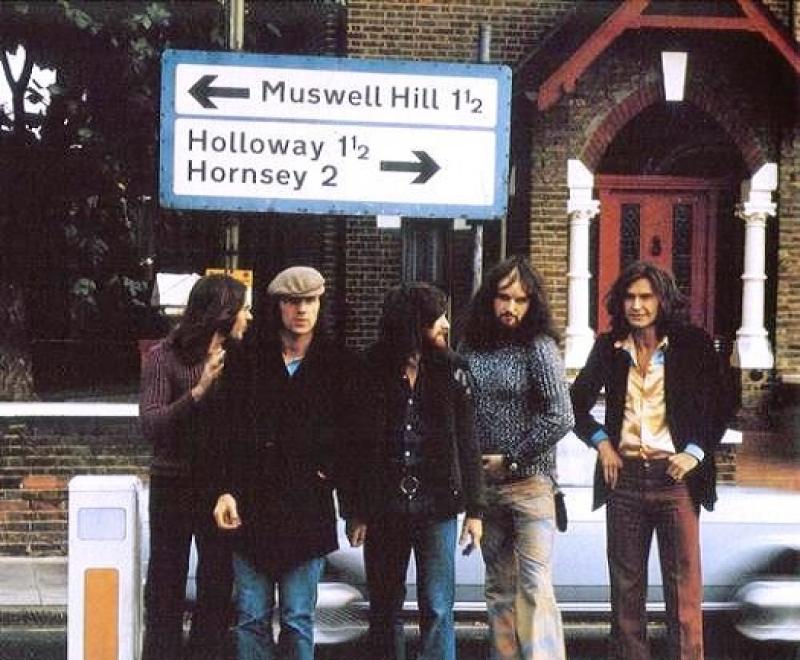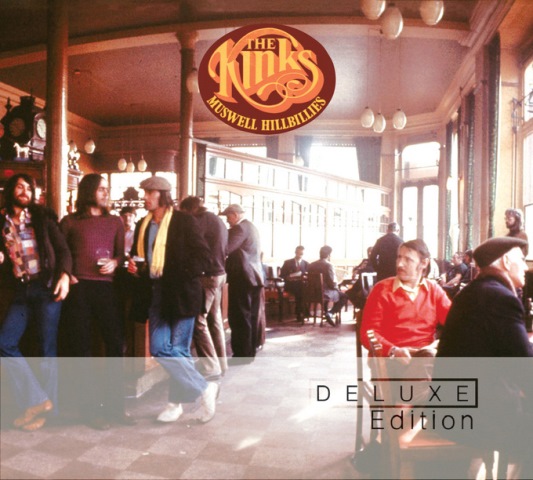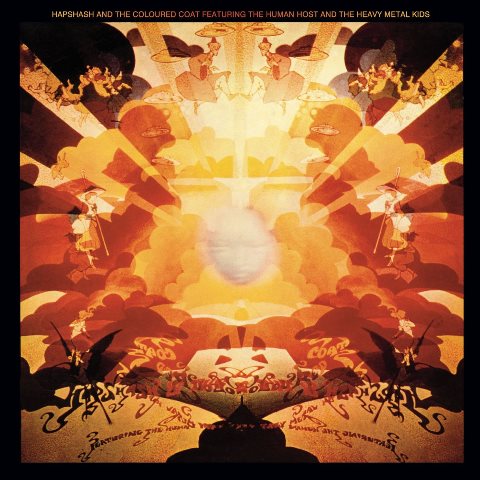Reissue CDs Weekly: The Kinks, Hapshash and the Coloured Coat | reviews, news & interviews
Reissue CDs Weekly: The Kinks, Hapshash and the Coloured Coat
Reissue CDs Weekly: The Kinks, Hapshash and the Coloured Coat
British greats take on America while poster artists try psychedelic music on for size

 The Kinks: Muswell Hillbillies
The Kinks: Muswell Hillbillies
Rock’s rich tapestry currently has it that 1968’s The Kinks are the Village Green Preservation Society is their best album. This deluxe edition, 2CD reissue of 1971’s Muswell Hillbillies isn’t going to alter that, but it does force the emphasis away from the notion that their most lasting legacy will be a fascination with and celebration of Britishness.
The album found Ray Davies and co looking to American archetypes, musical and cultural, and bringing them into songs drawing figurative links between the former colony and those still wedded to the old country. Although explicit in the title song’s pun (watch them perform it overleaf) on north London's Muswell Hill, the connection would prove prescient for The Kinks themselves as the album paved the way for their American breakthrough.
Of course, America was always integral to The Kinks. Their first, flop, single was an interpretation of Little Richard’s version of “Long Tall Sally”. Ray and brother Dave bulked out their Sixties albums with blues and rock ‘n’ roll covers. Then, in 1965, with “Well Respected Man”, they looked closer to home and their palette broadened. Muswell Hillbillies was the possibly belated integration of the two. It was their first album for new label RCA. Up to then, they were with Britain’s Pye. RCA was American. It was Elvis’s label.
The previous Muswell Hillbillies reissue from 1998 had just two bonus tracks, “Mountain Woman" and "Kentucky Moon". This time round these slot into a whole disc of bonuses, while the compilers have sensibly kept Disc One for the original album only.
The 'Muswell Hillbillies’ songs are as sharp as anything Ray Davies wrote in the Sixties
Blues, bluegrass and country as well as music hall are ransacked on Muswell Hillbillies for songs about excess (“Skin and Bone", “Alcohol”), loss of identity (“20th Century Man”, “Here Come the People in Grey” – sloppily misspelt "gray" in the package’s annotation), the frustrations of routine (“Have a Cuppa Tea”, "Uncle Son”) and obsession (“Acute Schizophrenia Blues”, “Holiday”). Funny, reflective and clever, the Muswell Hillbillies songs are as sharp as anything Ray Davies wrote in the Sixties. They are also very specific geographically. Holloway Prison gets a namecheck, and with its sleeve photo taken in north London's Archway Tavern, the album was inspired by the area where the Davies brothers had grown up. It was also about the current-day Ray Davies – his diagnosis with depression would soon become public knowledge.
Disc Two kicks off with a revelation. The previously unheard "Lavender Lane", recorded during the album sessions but shelved, is a rewrite of 1967’s “Waterloo Sunset”. Despite the densely-written liner notes drawing on interviews with band members, the reason for the recycling is not explained. It’s a curio that really needs digging into. The bonuses included are a triumph of archive research, though. The demos, unreleased tracks, alternate (contemporaneous) mixes and BBC versions amount to a new reading of the album. Beyond "Lavender Lane", a demo of “Nobody’s Fool”, prepared for BBC TV, is the highlight.
After Muswell Hillbillies came the silly "Supersonic Rocket Ship", the poignant "Celluloid Heroes", an on-stage declaration from Ray Davies that he was giving it all up, and then success in America. This fine, often-overlooked, transitional album more than deserves the treatment afforded it here.
Overleaf: Hapshash and the Coloured Coat
 Hapshash and the Coloured Coat: Featuring the Human Host and the Heavy Metal Kids
Hapshash and the Coloured Coat: Featuring the Human Host and the Heavy Metal Kids
This out-there album from 1967 was a vehicle for two non-musicians. Hapshash and the Coloured Coat were Michael English and Nigel Waymouth, the artists responsible for Swinging Britain's most arresting psychedelic posters. Waymouth also ran the hip King’s Road boutique Granny Takes a Trip, while English had designed for a Carnaby Street shop. Enter future Mott the Hoople and Clash producer Guy Stevens with his wild idea that the duo should make an album. As outlandish as this was, it wasn’t on its own. The next year saw the London-based Dutch hippy clothes and arts collective The Fool also release an album. Strange times. Ray Davies could have written a song lampooning these follies.
For the Hapshash musical happening, Stevens assembled members of Art, a band he was producing who later turned into Spooky Tooth. Their guitarist Luther Grosvenor exited the sessions saying, according to Waymouth in the liner notes, “this isn’t rock ‘n’ roll.”
It certainly wasn’t. The album included five instantly conjured-up, free-form tracks with groovy titles like “A Mind Blown Is a Mind Shown” and “The New Messiah Coming 1985”. Melody was eschewed in favour of being as far-out as possible. Guitars chug and churn, exotic percussion is banged and a piano rattles out odd notes. A cracked harmonica tries for the blues. Emerging randomly from this chaos are vocals which chant mystically. Somehow, Liberty Records were talked into issuing this artefact. A whole album akin to the nonsensical filler between the tracks on the Stones' Satanic Majesties, it was analogous to the oddities being issued by New York’s ESP-Disk label. Naturally, English and Waymouth’s sleeve was suitably striking. Bonkers, but essential to understanding a London underground in thrall to the limitlessness suggested by the psychedelic experience.
Watch The Kinks performing “Muswell Hillbillies” and “You're Looking Fine” in 1972
Buy
Share this article
The future of Arts Journalism
You can stop theartsdesk.com closing!
We urgently need financing to survive. Our fundraising drive has thus far raised £33,000 but we need to reach £100,000 or we will be forced to close. Please contribute here: https://gofund.me/c3f6033d
And if you can forward this information to anyone who might assist, we’d be grateful.

Subscribe to theartsdesk.com
Thank you for continuing to read our work on theartsdesk.com. For unlimited access to every article in its entirety, including our archive of more than 15,000 pieces, we're asking for £5 per month or £40 per year. We feel it's a very good deal, and hope you do too.
To take a subscription now simply click here.
And if you're looking for that extra gift for a friend or family member, why not treat them to a theartsdesk.com gift subscription?
more New music
 Album: Joan Armatrading - How Did This Happen and What Does It Now Mean
Held in love and affection
Album: Joan Armatrading - How Did This Happen and What Does It Now Mean
Held in love and affection
 Album: FaithNYC - Love is a Wish Away
Wonderfully produced off-piste music
Album: FaithNYC - Love is a Wish Away
Wonderfully produced off-piste music
 English Teacher, Queen Margaret Union, Glasgow review - Mercury winners step up in size with style
The Leeds quartet's set was varied in genre but thrilling when punchy
English Teacher, Queen Margaret Union, Glasgow review - Mercury winners step up in size with style
The Leeds quartet's set was varied in genre but thrilling when punchy
 Album: Father John Misty - Mahashmashana
The flawless union of style and substance
Album: Father John Misty - Mahashmashana
The flawless union of style and substance
 Kenny Barron Trio, Ronnie Scott's review - a master of the cool
Eloquent story-telling from jazz giant
Kenny Barron Trio, Ronnie Scott's review - a master of the cool
Eloquent story-telling from jazz giant
 Album: Body Count - Merciless
Ice goes on autopilot
Album: Body Count - Merciless
Ice goes on autopilot
 Music Reissues Weekly: Magazine - Real Life, Secondhand Daylight, The Correct Use of Soap
The first three albums from Howard Devoto’s post-punk marvels hit the shops again
Music Reissues Weekly: Magazine - Real Life, Secondhand Daylight, The Correct Use of Soap
The first three albums from Howard Devoto’s post-punk marvels hit the shops again
 Bob Dylan, Royal Albert Hall review - cracked ritual from rock elder
A glorious mixture of mask and authenticity
Bob Dylan, Royal Albert Hall review - cracked ritual from rock elder
A glorious mixture of mask and authenticity
 ARK: United States V by Laurie Anderson, Aviva Studios, Manchester review - a vessel for the thoughts and imaginings of a lifetime
Despite anticipating disaster, this mesmerising voyage is full of hope
ARK: United States V by Laurie Anderson, Aviva Studios, Manchester review - a vessel for the thoughts and imaginings of a lifetime
Despite anticipating disaster, this mesmerising voyage is full of hope
 Album: Linkin Park - From Zero
California metal icons mark new era with captivating eighth album
Album: Linkin Park - From Zero
California metal icons mark new era with captivating eighth album
 Rachel Chinouriri, Queen Margaret Union, Glasgow review - a formidable and genre-hopping talent
The singer lifted elements from throughout pop history during an exciting set
Rachel Chinouriri, Queen Margaret Union, Glasgow review - a formidable and genre-hopping talent
The singer lifted elements from throughout pop history during an exciting set
 Album: Jon Batiste - Beethoven Blues
Beethoven's hits reimagined by the American musical celebrity
Album: Jon Batiste - Beethoven Blues
Beethoven's hits reimagined by the American musical celebrity

Add comment